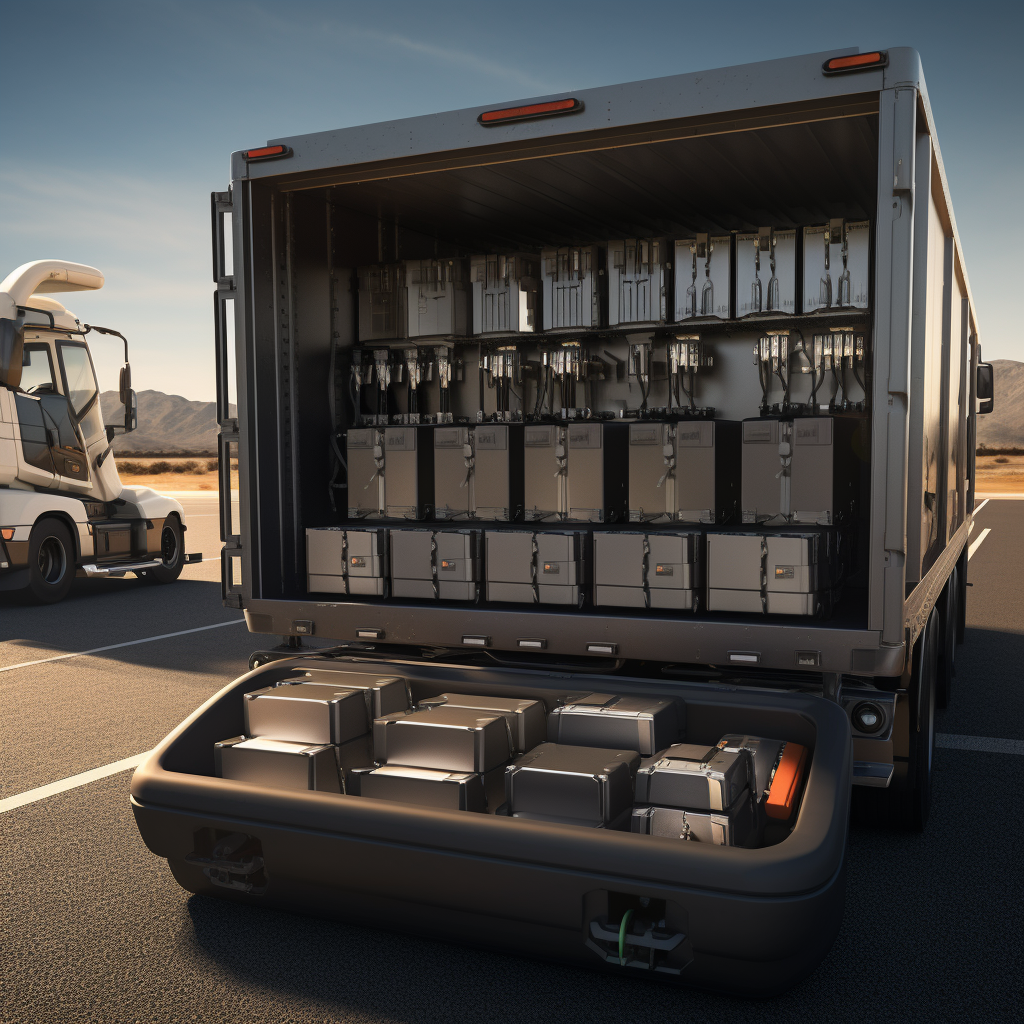Contents
Fleet management is a vast discipline, and it comes with a myriad of responsibilities. One of those critical responsibilities is ensuring that the fleet vehicle batteries are in optimal condition. While it might seem like a minor concern compared to other aspects of fleet management, battery upkeep is pivotal for several reasons. An outdated or inefficient battery can pose risks, both economically and environmentally, and can hinder the smooth operation of the fleet. This article dives deep into the significance of keeping fleet vehicle batteries up to date and presents a comprehensive understanding of the matter for those in the industry.
The Importance of Fleet Vehicle Batteries
In today’s fast-paced world, fleet vehicles, ranging from delivery trucks to passenger buses, play a crucial role in ensuring the smooth flow of goods and services. At the heart of these vehicles lies their battery system. Batteries are more than just a power source; they are an integral component that influences several aspects of fleet management:
- Reliability: A vehicle’s reliability heavily depends on the state of its battery. A well-maintained, up-to-date battery ensures that the vehicle starts every time, reducing downtime and ensuring timely deliveries or services.
- Operational Costs: Batteries that are not maintained or outdated tend to strain the vehicle’s electrical system. This can lead to higher fuel consumption, frequent maintenance requirements, and even damage to other vehicle components. In contrast, an efficient battery can reduce operational costs and increase profitability.
- Safety: Fleet vehicles with faulty batteries are at risk of electrical failures. Such failures can lead to situations where vehicles break down in unsafe areas or, worse, lead to accidents due to malfunctions of critical components powered by the battery.
- Performance and Efficiency: Modern fleet vehicles come equipped with advanced technological features like GPS, temperature control, and advanced driver-assistance systems (ADAS). These systems require a consistent and efficient power source. An up-to-date battery ensures that these features function optimally, enhancing the vehicle’s overall performance and efficiency.
Understanding the importance of fleet vehicle batteries is the first step. However, recognizing the repercussions of neglecting their maintenance is equally vital.

The Consequences of Neglecting Battery Maintenance
Every fleet manager understands the ripple effect of a single vehicle’s malfunction. An issue as seemingly small as a battery problem can snowball into significant operational challenges. When battery maintenance is neglected, the consequences are multi-faceted:
- Increased Downtime: Battery failures are among the leading causes of vehicle breakdowns. When a vehicle is sidelined due to battery issues, not only is that vehicle out of commission, but there’s also the added time and expense of troubleshooting, repairs, or replacements.
- Elevated Maintenance Costs: A faltering battery can stress other parts of the vehicle. For instance, an overworked alternator, trying to compensate for a weak battery, may wear out sooner than expected. Such cascading effects mean higher maintenance costs and potential replacement of parts that might have otherwise had a longer lifespan.
- Loss of Revenue: A vehicle that isn’t on the road is one that isn’t generating revenue. Frequent battery issues can lead to missed delivery windows, unmet contracts, and potential penalties or lost business opportunities.
- Safety Concerns: An unreliable battery can cause erratic behavior in the vehicle’s systems. From the headlights dimming unexpectedly to crucial safety systems failing to activate, the risks to the driver and other road users become considerably higher.
- Environmental Impact: Discarding batteries prematurely contributes to environmental waste. Moreover, inefficient batteries can lead to increased fuel consumption, further exacerbating a fleet’s carbon footprint.
- Brand Reputation: In the age of social media and instant news, a single stranded vehicle with visible branding can lead to negative publicity. Consistent issues can harm a brand’s reputation, making it harder to secure contracts or retain clients.
Preventing these consequences requires an understanding of the latest in battery technology and a proactive approach to maintenance.
Advancements in Fleet Vehicle Battery Technology
The automotive industry has seen a technological revolution in recent years, and batteries haven’t been left behind. As fleet vehicles become more advanced, the batteries that power them have also evolved to meet rising demands. Here’s a look at some of the key advancements in fleet vehicle battery technology:
- Lithium-Ion Batteries: Replacing the traditional lead-acid batteries, lithium-ion batteries offer several advantages. They are lighter, have a higher energy density, and a longer lifespan. Their fast-charging capabilities are particularly beneficial for fleets that need quick turnarounds.
- Battery Management Systems (BMS): Modern batteries often come equipped with BMS, which continuously monitors the battery’s state of charge, health, and other crucial parameters. This technology helps in preventing overcharging, deep discharging, and can significantly extend a battery’s lifespan.
- Energy Recovery Systems: Some modern fleet vehicles use regenerative braking, which captures the energy usually wasted during braking and converts it to electricity. This electricity is then used to recharge the vehicle’s battery, enhancing its efficiency.
- Telematics Integration: With the integration of telematics systems, fleet managers can remotely monitor the health and charge status of vehicle batteries. This not only aids in proactive maintenance but also helps in planning routes and schedules based on the battery’s state.
- Improved Lifespan and Durability: Advances in battery manufacturing and the materials used have led to batteries that can withstand more charge and discharge cycles. This means that they need replacement less often, leading to reduced operational costs.
While these advancements offer several benefits, they also underline the importance of staying updated. An old fleet vehicle battery may not only lack these features but might also be incompatible with modern systems, highlighting the need for timely updates.

Environmental and Economic Benefits of Up-to-Date Batteries
In an era where sustainability and cost-efficiency are paramount, the decision to maintain and update fleet vehicle batteries has repercussions beyond the immediate operational context. Let’s explore the twin benefits of environmental responsibility and economic prudence that up-to-date batteries bring:
- Reduction in Carbon Footprint: Modern batteries, especially lithium-ion types, tend to be more efficient, translating to vehicles that consume less fuel. For fleets that consist of hundreds or thousands of vehicles, even a slight improvement in fuel efficiency can lead to significant reductions in carbon emissions.
- Decreased Waste: Updated batteries have a longer operational life. This means fewer replacements and, consequently, fewer batteries being disposed of. Given the hazardous materials present in batteries, this can have a meaningful impact on reducing environmental pollution.
- Cost Savings on Fuel: As aforementioned, an efficient battery contributes to better fuel efficiency. Considering the cost of fuel, especially in large fleets, this can amount to substantial savings over time.
- Reduced Maintenance and Replacement Costs: Updated batteries are less prone to failures and wear and tear. This results in fewer maintenance checks, less downtime, and a reduced need for replacements. These savings, when scaled to a fleet level, can be substantial.
- Eligibility for Green Incentives: Many governments and institutions provide incentives for businesses that adopt green practices. Maintaining an eco-friendly fleet with up-to-date batteries might make businesses eligible for tax breaks, subsidies, or other financial incentives.
- Enhanced Brand Image: In today’s market, consumers are more inclined towards businesses that show environmental responsibility. A fleet that is known to be eco-friendly can serve as a strong marketing tool and give a competitive edge.
Considering these benefits, it becomes evident that the decision to update and maintain fleet vehicle batteries isn’t just about immediate operational efficiency. It’s also a strategic move with long-term economic and environmental advantages.
Steps to Ensure Your Fleet Vehicle Batteries are Up to Date
Ensuring that your fleet’s vehicle batteries remain updated is not just a one-time task, but an ongoing commitment. By adopting a structured approach, fleet managers can make certain that their fleet operates at peak efficiency and reliability. Here are some recommended steps:
- Regular Inspections: Schedule routine checks to assess the state of each vehicle’s battery. Look for signs of wear, corrosion, or damage. Modern batteries often have indicators that provide insights into their health.
- Use Telematics: Integrate advanced telematics systems to receive real-time data about the battery’s performance. This enables proactive interventions before minor issues evolve into significant problems.
- Training for Fleet Staff: Ensure that all personnel, from drivers to maintenance crews, are trained to recognize early signs of battery issues. An informed team can help in early detection and timely resolutions.
- Stay Updated on Battery Advancements: Technology evolves rapidly. By keeping abreast of the latest in battery technology, fleet managers can make informed decisions about when and how to upgrade.
- Invest in Quality: When replacing batteries, prioritize quality over cost savings. A high-quality battery might have a higher upfront cost but can result in long-term savings due to its longevity and efficiency.
- Implement Energy Recovery Systems: For fleets that haven’t already, consider vehicles with energy recovery systems, like regenerative braking. It can increase the battery’s life and improve vehicle efficiency.
- Battery Recycling: When batteries reach the end of their life, ensure they are recycled properly. This not only aids in environmental conservation but can also offer economic benefits as many recyclers provide compensation for old batteries.
- Create a Replacement Schedule: Based on the expected lifespan of the batteries used in your fleet, create a proactive replacement schedule. This avoids the risks associated with batteries reaching the end of their life unexpectedly.
- Vendor Partnerships: Develop strong relationships with battery suppliers. They can provide insights, bulk deals, and priority services, ensuring your fleet is never left wanting for battery support.
- Feedback Loop: Encourage feedback from drivers and operational staff. Their on-ground experience can provide invaluable insights into real-world battery performance and areas of potential concern.
By following these steps, fleet managers can ensure a seamless operational experience, reduce unexpected downtimes, and maximize the economic and environmental benefits of up-to-date batteries.
Conclusion
The intricate dynamics of fleet management are undeniably vast, encompassing a wide range of responsibilities and challenges. At the nucleus of these challenges lies the critical component that often goes unnoticed until a problem arises: the vehicle battery. As we’ve highlighted throughout this article, the vitality of fleet vehicle batteries extends far beyond merely starting the engine. It plays a pivotal role in ensuring reliability, safety, economic efficiency, and environmental responsibility.
In today’s age of heightened environmental consciousness and rapid technological advancements, the rationale for keeping fleet vehicle batteries updated is two-fold. On one hand, it promises operational efficiency, reduces costs, and minimizes unforeseen downtimes. On the other, it upholds a company’s reputation as a responsible and forward-thinking entity, paving the way for more sustainable and eco-friendly operations.
In conclusion, the battery, though a small component in the grand scheme of fleet vehicles, holds the potential to influence the entire fleet’s performance. It stands as a testament to the adage that sometimes, it’s the smallest pieces that make the most significant impact. As fleet managers or business owners, investing time, effort, and resources in battery upkeep is not just an operational necessity—it’s a strategic move towards a more efficient, profitable, and sustainable future.

